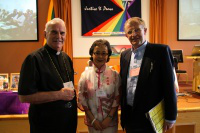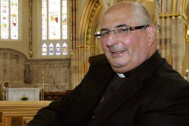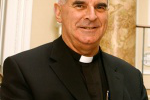'One Church' in China, Scottish Cardinal tells NJPN conference

Cardinal O'Brien, Xinran & Fr Eamonn O'Brien. Picture by Yuan Chao Xue
“There is only one Church in China” a Chinese Catholic bishop once told Cardinal Keith O’Brien, Archbishop of St Andrews and Edinburgh, “and we are all members of that church”. The Cardinal repeated the conversation on Saturday at the annual conference of the National Justice and Peace Network Conference in Derbyshire, where the theme was ‘A New World Order? China today and our response’. He suggested that Chinese Catholics, who number around 12 million, are overwhelmingly loyal to the Pope, but also “loyal to their country as their conscience allows”. The distinction between the official government controlled church and the ‘underground’ church, with allegiance to Rome, generally isn’t there at grassroots level.
Despite improving religious freedom in China, there has been a recent racketing up of tensions between Beijing and the Vatican over episcopal appointments in China. The cardinal said it has seemed that a “cat and mouse game” is going on where episcopal candidates put forward by one are then not accepted by the other. The 7 July announcement by Shanghai's auxiliary bishop, Ma Daqin, that he was leaving the government-controlled Catholic Patriotic Association (CPA) at the end of his ordination ceremony threw fuel onto the fire. The consecration had been agreed to by the Vatican and the Chinese authorities and so his appointment was not expected to be controversial. The move marked the biggest public challenge to Beijing's control over the Catholic clergy in years. Just the previous day, the ordination of a new bishop in Harbin without papal endorsement had already prompted a clash. Cardinal O’Brien regretted that “these divisions continue to this present time”. He hoped for healing, and urged that the special day of prayer for the Catholic Church in China on 24 May be marked throughout the UK.
Cardinal O’Brien said he preferred to focus on the “good things” going on in the Church in China that he witnessed during a visit there in 2007 organised by Cultural Exchange with China (CEC). Amongst these, he mentioned the flourishing of religious communities in China, the “openness” of young men in Chinese seminaries, and solidarity visits to China by religious groups from the West. CEC’s organising of British teachers to work for a limited time in China was mentioned as a valuable exchange.
The Cardinal’s address came during Mass with around 300 Justice and Peace campaigners from across England and Wales, with international participation. It was the 34th annual Conference of the National Justice & Peace Network, and organised in conjunction with CEC and Leeds Justice & Peace Commission. The weekend was a good-humoured celebration of Chinese culture, with early morning Tai Chi on the lawn, an opportunity to try Chinese calligraphy and a session on human rights and the Chinese poets run by former Leeds MP John Battle. A direct flavour of China was introduced when conference participants were greeted during a Skype call by Sr Mary Niu – at 4am her time - who recently founded a contemplative monastery of the Sisters of St Augustine in China, the first such establishment since 1949. She received a resounding round of applause.
Fr Eamonn O’Brien, the Columban Director of CEC who chaired the conference said, “beyond the glitz, quest for wealth and all the negative images with which the western media portrays Chinese society, there is also a profound and sincere core of deep search for truth in a way that I have never experienced in any country I have worked in”.
A Chinese Church scholar speaking at the conference said: “I am so impressed by the NJPN, that so many people are so positive about China and ways to engage with it”.
Justice and Peace issues in relation to China included a focus on Chinese mothers who have lost or had to abandon children, largely because of the country’s one-child policy, from Xinran, author of Message From an Unknown Chinese Mother (2010); the social problems of China’s estimated 200 million migrant workers in the country’s cities from Bingqin Li, a Lecturer in Social Policy at the London School of Economics; and a look at CAFOD support for a HIV/AIDS programme in Liaoning Diocese by Jim Simmons of CAFOD. Martin Palmer, Secretary General of the Alliance of Religions and Conservation, reported that China has awoken to the threat of environmental degradation in ways unimaginable just a few years ago. The Chinese Communist government is now asking religions to help reinstate a sense of a purpose beyond just self and consumerism and to help protect China’s sacred sites.
Follow-up actions ideas suggested by conference participants included befriending local Chinese students who are among 100,000 studying in the UK, considering teaching English in China with CEC, supporting Church work on HIV/AIDS in China, and linking with Catholic dioceses in China. There was general agreement that there should be a willingness to learn more about modern day China – the world’s most populous country which boasts enviable economic growth rates but also a growing inequality gap.
Reports on detailed aspects of the conference will appear over the rest of this week.
See also: www.justice-and-peace.org.uk


















